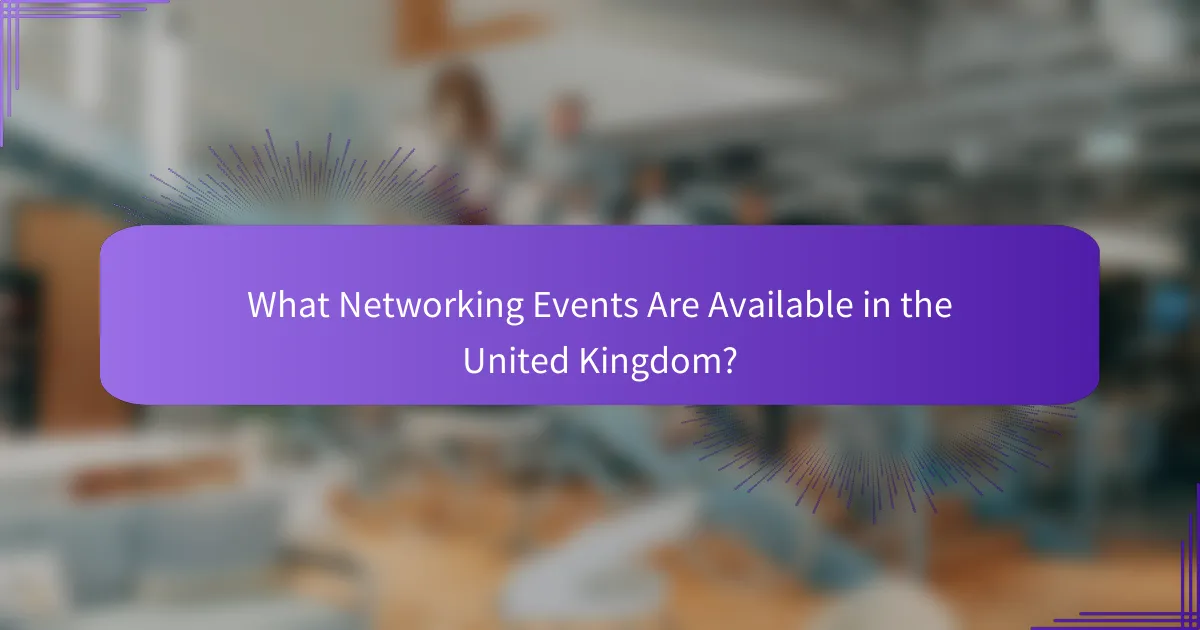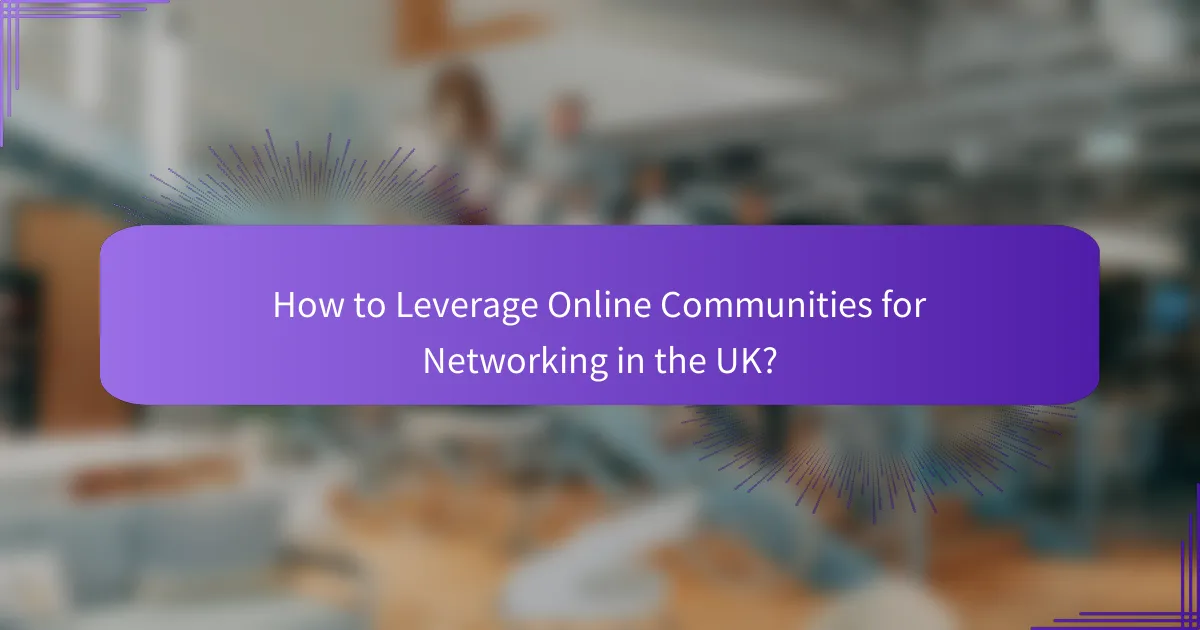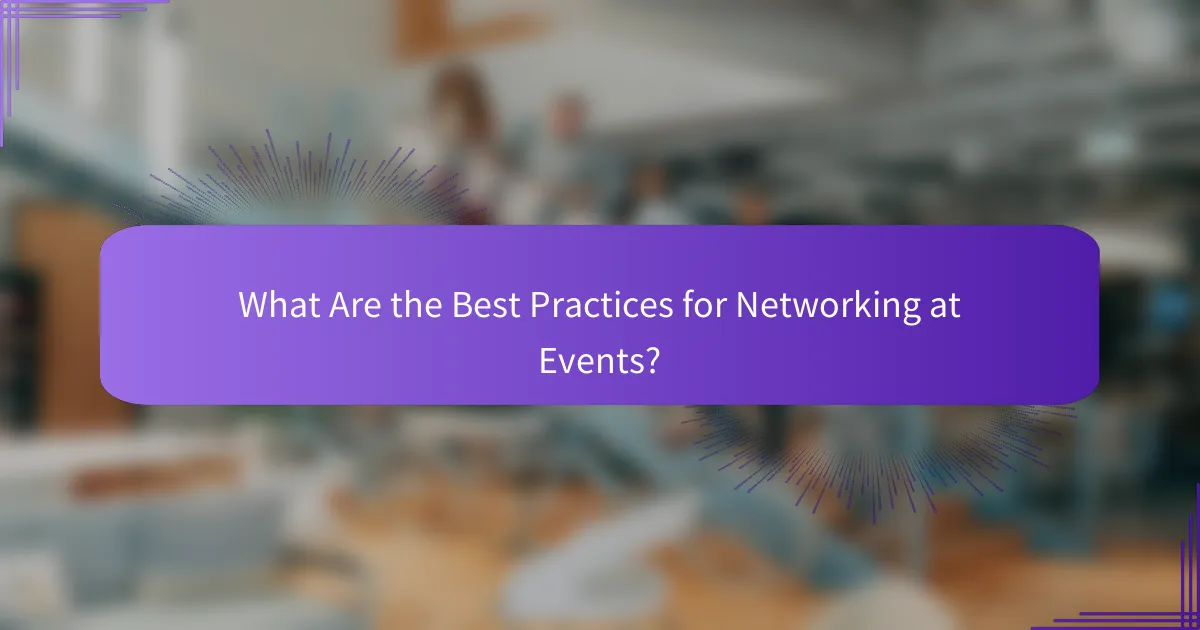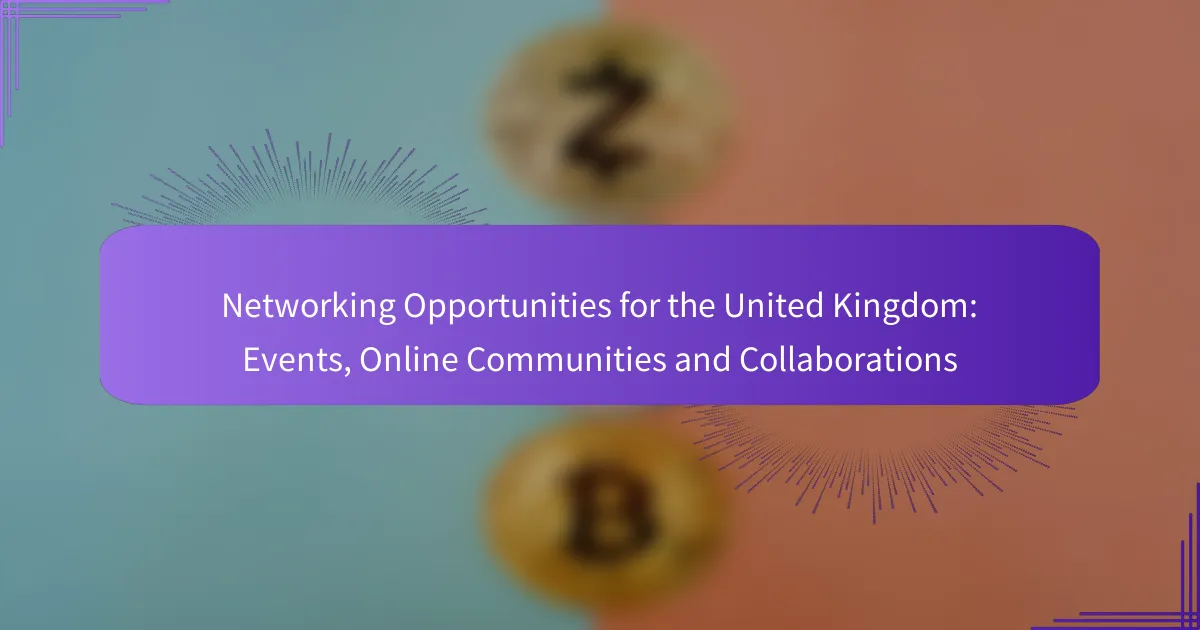The United Kingdom is a hub for diverse networking opportunities, featuring a range of events from large conferences to intimate meetups tailored to various industries. In addition to in-person gatherings, online communities serve as vital platforms for professionals to connect and collaborate, fostering valuable relationships and insights. Engaging in these networking avenues can lead to fruitful partnerships and enhanced professional growth.

What Networking Events Are Available in the United Kingdom?
The United Kingdom offers a variety of networking events that cater to different industries and interests, providing opportunities for professionals to connect, collaborate, and grow. These events range from large-scale conferences to smaller meetups, each designed to foster relationships and share knowledge.
TechCrunch Disrupt London
TechCrunch Disrupt London is a premier technology conference that attracts startups, investors, and industry leaders. This event features panel discussions, startup pitches, and networking sessions, making it an ideal platform for entrepreneurs to showcase their innovations and connect with potential partners.
Attendees can participate in workshops and gain insights from experienced speakers, enhancing their understanding of the tech landscape. Consider preparing an elevator pitch to make the most of your networking opportunities at this event.
London Tech Week
London Tech Week is a week-long celebration of technology and innovation, featuring hundreds of events across the city. It brings together tech professionals, entrepreneurs, and investors to share ideas and explore new trends in the industry.
With events ranging from conferences to informal meetups, participants can choose sessions that align with their interests. Engaging in discussions and attending workshops can significantly expand your professional network during this vibrant week.
UK Business Networking Events
The UK hosts numerous business networking events that cater to various sectors, including finance, marketing, and creative industries. These events often take place in major cities like London, Manchester, and Birmingham, providing ample opportunities for professionals to connect.
Many of these gatherings are organised by local chambers of commerce or industry associations, offering structured networking formats such as speed networking or roundtable discussions. Be sure to bring business cards and be prepared to discuss your work to maximise your connections at these events.

How to Leverage Online Communities for Networking in the UK?
Online communities provide valuable platforms for networking in the UK, allowing professionals to connect, share insights, and collaborate. Engaging in these communities can lead to new opportunities and partnerships, enhancing your professional network significantly.
LinkedIn Groups for UK Professionals
LinkedIn groups are a powerful tool for UK professionals to connect with like-minded individuals in their industry. Joining relevant groups allows you to participate in discussions, share expertise, and discover job opportunities. Look for groups that focus on your specific field or interests to maximise your networking potential.
When selecting LinkedIn groups, consider their activity level and member engagement. Aim for groups with regular posts and active discussions, as this indicates a vibrant community. Don’t hesitate to introduce yourself and contribute to conversations to establish your presence.
Facebook Networking Groups
Facebook networking groups offer a more informal setting for UK professionals to connect and collaborate. These groups often focus on specific industries, interests, or geographic areas, making it easier to find relevant contacts. Engaging in these communities can lead to valuable connections and insights.
To make the most of Facebook networking groups, actively participate by asking questions, sharing resources, and offering assistance to others. Be mindful of group rules and etiquette, as maintaining a respectful and professional demeanour is crucial for building lasting relationships.

What Are the Benefits of Collaborations in the UK?
Collaborations in the UK offer significant advantages, including expanded market access and the pooling of resources and expertise. By partnering with other organisations, businesses can leverage shared strengths to enhance innovation and efficiency.
Access to New Markets
Collaborating with local or international partners can provide businesses in the UK with entry into new markets. This is particularly beneficial for small and medium-sized enterprises (SMEs) looking to expand their reach without the heavy investment typically required for market entry.
For example, a UK-based tech startup might partner with a European firm to tap into the EU market, benefiting from the partner’s established networks and customer base. This approach can reduce the risks associated with entering unfamiliar territories.
Shared Resources and Expertise
Collaborations allow businesses to share resources, such as technology, facilities, and human capital, which can lead to cost savings and increased operational efficiency. By pooling expertise, companies can tackle complex projects that would be challenging to manage independently.
For instance, a UK manufacturer could collaborate with a research institution to develop innovative products, accessing cutting-edge research and skilled professionals. This synergy can accelerate product development and enhance competitiveness in the marketplace.

Which Digital Platforms Facilitate Networking in the UK?
Several digital platforms are essential for networking in the UK, enabling professionals to connect, collaborate, and share opportunities. These platforms cater to various industries and interests, making it easier to find relevant events and communities.
Meetup.com
Meetup.com is a popular platform for organising local events and gatherings based on shared interests. Users can create or join groups that focus on specific topics, ranging from technology to arts, and participate in events that facilitate face-to-face networking.
To make the most of Meetup.com, consider joining groups that align with your professional goals. Look for events that are well-attended and actively engage with participants to build meaningful connections. Regularly check for new events, as they can vary widely in frequency and format.
Eventbrite
Eventbrite is another widely used platform for discovering and promoting events across the UK. It allows users to search for networking events, workshops, and conferences, providing a comprehensive list of opportunities to connect with others in your field.
When using Eventbrite, filter events by location, date, and category to find the most relevant options. Pay attention to ticket prices, as many events offer free admission, while others may charge a fee. Engaging with event organisers and attendees can enhance your networking experience and lead to valuable collaborations.

How to Choose the Right Networking Event in the UK?
Selecting the right networking event in the UK involves understanding your objectives and the audience you wish to connect with. Focus on events that align with your professional goals and offer opportunities to meet individuals who can help you achieve them.
Assess Your Goals
Begin by clearly defining what you want to achieve from attending a networking event. Are you looking to find a mentor, explore job opportunities, or expand your industry knowledge? Knowing your goals will help you select events that are most relevant to your needs.
Consider creating a checklist of your objectives. For instance, if you aim to meet potential employers, prioritise job fairs or industry-specific conferences. If you seek to learn, workshops or seminars may be more beneficial.
Consider the Audience
Understanding the audience at a networking event is crucial for making meaningful connections. Research who typically attends the events you are considering, such as industry professionals, entrepreneurs, or academics.
Look for events that attract individuals from your field or those with similar interests. This can enhance the quality of interactions and increase the likelihood of forming valuable relationships. Utilise platforms like LinkedIn or event websites to gauge the expected attendees.

What Are the Best Practices for Networking at Events?
Effective networking at events involves preparation, engagement, and follow-up. By honing your approach, you can build meaningful connections that may lead to future collaborations or opportunities.
Prepare Your Elevator Pitch
Your elevator pitch is a concise summary of who you are and what you do, typically lasting around 30 seconds. It should clearly communicate your professional background, skills, and what you are looking to achieve through networking.
To craft an effective pitch, focus on key elements: your name, your current role, and a unique aspect of your experience or goals. Practice delivering it confidently to ensure you make a strong first impression.
Follow Up After the Event
Following up after a networking event is crucial for solidifying connections. Aim to reach out within a few days, ideally through a personalised email or a message on a professional platform like LinkedIn.
In your follow-up, reference your conversation to jog their memory, express your appreciation for their time, and suggest a next step, such as a coffee meeting or a phone call. This keeps the dialogue open and shows your genuine interest in maintaining the relationship.

How Can You Measure the Success of Networking Efforts?
Measuring the success of networking efforts involves assessing both the connections made and the opportunities generated. This evaluation helps determine the effectiveness of your networking strategy and guides future efforts.
Track Connections Made
Tracking connections made during networking events is essential for understanding your reach and influence. Keep a record of new contacts, including their names, roles, and how you met them. Use a spreadsheet or a dedicated app to organise this information for easy access.
Consider categorising your connections based on their industry or potential collaboration opportunities. This can help you prioritise follow-ups and identify which relationships are most beneficial for your goals.
Evaluate Opportunities Generated
Evaluating the opportunities generated from your networking efforts is crucial for measuring success. Look for tangible outcomes such as job offers, collaborations, or partnerships that arose from your connections. A simple way to assess this is to set specific goals before networking events and review them afterward.
Additionally, track qualitative feedback from your network. Ask for insights on how your connections perceive the value of your interactions. This feedback can provide valuable context to the numerical data you collect and help refine your future networking strategies.

What Emerging Trends Are Shaping Networking in the UK?
Networking in the UK is increasingly influenced by digital transformation, remote work, and a focus on inclusivity. These trends are reshaping how professionals connect, collaborate, and build relationships across various industries.
In-Person Networking Events
In-person networking events remain vital for relationship building in the UK. Conferences, trade shows, and local meetups provide opportunities for face-to-face interactions that can lead to meaningful connections. Consider attending industry-specific events, as they often attract key players and decision-makers.
To maximise your experience, prepare by researching attendees and having clear objectives. Bring business cards and be ready to discuss your work and interests. Networking events can range from large conferences with hundreds of participants to smaller, intimate gatherings.
Online Networking Platforms
Online networking platforms are becoming essential for UK professionals, especially in the wake of remote work trends. Websites like LinkedIn, Meetup, and industry-specific forums facilitate connections across geographical boundaries. These platforms allow users to join groups, participate in discussions, and showcase their expertise.
When using online platforms, engage actively by commenting on posts and sharing valuable content. Set aside time each week to connect with new contacts and follow up with personalised messages. This approach can significantly enhance your professional network.
Collaborative Projects and Partnerships
Collaborative projects and partnerships are increasingly popular in the UK, fostering innovation and shared success. Businesses and professionals are seeking alliances that leverage complementary skills and resources. Consider initiating or joining collaborative efforts within your industry to expand your network and enhance your visibility.
To find potential partners, attend industry events, utilise online platforms, or engage in community initiatives. Clearly define the goals and expectations of any collaboration to ensure mutual benefit. Successful partnerships can lead to new opportunities and strengthen your professional reputation.
